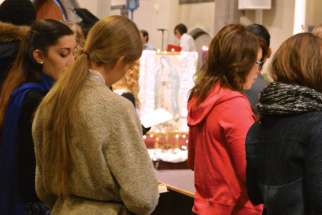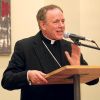Political passion looks for a place on campus
For most Catholics on the greyer side of the generation divide, student politics today definitely isn’t what it used to be.
Anti-Semitism goes hand-in-hand with anti-Israel activities at U.S. colleges, according to a new report that one critic called a “crude rhetorical cudgel” against the so-called Boycott, Divestment and Sanctions movement.
Campus pro-lifers take their fight to courts
TORONTO - Five pro-life student groups are before the courts fighting to have their voice heard on campus.
Faith on campus a recruiting asset
TORONTO - As due dates for university applications are fast approaching, many Catholic students are taking time to consider faith before making any final decisions.
College students flock to university campus for faith
College students in Toronto are turning to local universities for what’s lacking on their own school campuses — Catholic chaplaincies.
Miller makes the case for theology on campus
TORONTO - Theology should be at the heart of Catholic universities, Vancouver Archbishop J. Michael Miller told a Toronto audience Nov. 28.
Speech is not so free on our campuses
A new study by the Justice Centre for Constitutional Freedom (JCCF) found that many Canadian university campuses may embrace the principle of free speech but in practice give it a rough ride.
Some campuses received an “A” for their written policies and statements about free speech, but a far lower grade for implementing those policies and settling disputes. To anyone who has watched the treatment of university pro-life clubs in the past decade or so, the findings were not surprising but only confirmed the extent of the problem and pointed to where it could lead.
The JCCF’s Campus Freedom Index rated the policies of university administrations and student unions based on whether they supported and protected free speech on campus. The study also reviewed human rights policies and anti-discrimination policies to determine if they were being used to censor politically incorrect speech. Higher grades went to universities that had a clear anti-disruption policy that prohibited students and others from blocking, obstructing, suppressing or interrupting speech with which they disagree. The Index also examined policies governing the imposition of “security fees” as a means to discourage groups from inviting controversial or unpopular speakers to campus.
Among incidents with religious overtones, members of Carleton University’s pro-life club were arrested, handcuffed and charged with “trespassing” for attempting to express their views in a high-traffic area on campus. Simon Fraser University and the University of Calgary were both censured in the report for condoning the physical obstruction of pro-life displays on school property after campus security watched passively as the peaceful expression of opinion was made meaningless by obstructers using sheets and blankets to cover the message. The University of Western Ontario, University of Toronto and Carleton demanded that campus pro-life clubs confine their messages to isolated rooms, a restriction not placed on any other campus club, while St. Mary’s University forced the cancelation of a pro-life lecture by failing to provide adequate security to allow listeners to hear the presentation.
The survey also studied university policies on Israel Apartheid and inviting controversial political speakers on campus. In a National Post report on the findings, study co-author John Carpay, president of JCCF, said that while pro-life groups seem to be a “current target” on campus, in future it could be some other group that doesn’t fit with the popular view of the day.
An incident not included in the study suggests that day may be closer than we think. As reported in the Oct. 28 issue of The Catholic Register, a Catholic chaplaincy program at Brock University has faced harassment due to ties to the Sodalit movement, which a women’s studies professor claimed was affiliated with “far right” and “cult-like” Catholic organizations in Peru. Despite a ruling from Brock’s administration that the accusations are unfounded and the relationship between the university and SEA has been beneficial to the university, incidents of harassment continued, including an episode where a fundraising event was shut down by hecklers. The Ontario Human Rights Tribunal subsequently dismissed a claim of religious discrimination against the professor, ruling that her actions fell within the realm of academic freedom. (The CCRL had an advisory role in the case at the request of one of the volunteer chaplains.)
The tribunal’s assertion that the professor’s actions do not constitute religious discrimination is certainly arguable; harassment took place and it’s impossible to see any basis for it other than religious affiliation. Some of the academics who opposed the chaplaincy initiative stated their case more plainly when they declared point-blank at a rally in 2011 that they don’t want organizations with religious ties offering any work programs or volunteer experiences on campus.
Given the very strong relationship between religious belief and philanthropy, it’s hard to imagine where those volunteer opportunities will come from if organizations with religious ties are excluded. We have been witnessing an ongoing marginalization of religion in public life for several decades, so it’s quite possible that religious groups will be deemed to no longer fit with popular notions of who belongs on campus. Only a vigourous defence of campus free speech now — including the right to express ideas Catholics may dislike — will help prevent that from happening.
Chimney swifts a 'beautiful aspect' of King's University campus
King’s University College in London, Ont., has made a conscious effort to go green — and even the birds have noticed.
The Catholic college has incorporated the environment into its mandate and implemented many green initiatives, which range from solar panels to a volunteer “Green team” that organizes campus cleanups and tree planting.
But being a bird sanctuary? That wasn’t planned.
The large chimney attached to the Wemple Building at King’s is home to some 300 swifts every August and September, said King’s principal David Sylvester. Far from being a nuisance, Sylvester said the small, robin-sized birds have become a “beautiful aspect of the King’s campus.”
“On any given night in the summer here you can see the swifts returning to the chimney,” Sylvester said. “It’s like smoke coming in and out.”
That number has now grown. Three at-risk chimney swift birds, who have been in constant care since mid-July, were released into the wild at King’s Aug. 15. The birds were roosting in a chimney in a home in Aylmer, Ont., when their home fell into a furnace pipe. Swift Care Ontario, a London-based, newly certified wildlife rehabilitation charity, nursed them back to health by providing hourly feedings, vitamin and mineral supplements and housing in an artificial chimney. By Aug. 15, they were ready to go.
Debbie Lefebre, co-founder of Swift Care Ontario, said while there’s bound to be population loss with the release of swifts, many do survive — and each life matters.
“If we can save even one or two of them, put back into the wild population, that’s a bonus,” Lefebre said. “Every creature deserves to have its place in the web (of life).”
The number of swifts that flock to King’s each summer may be increasing, but the overall population of these birds has decreased by more than 95 per cent in the last 40 years. Luckily, there are not three more swifts being added to that statistic.
Sylvester said King’s being a home for so many swifts — and the location of the release of these now-healthy ones — suits King’s mission.
“It fits perfectly within our whole stewardship of the environment and our call as a Catholic college, (our) relationship to creation and the environment,” he said.
“It’s not like we made a conscious decision (to house them). They chose us. I would say we're lucky that the swifts chose us and we’ve just kept up our part of the bargain.”









